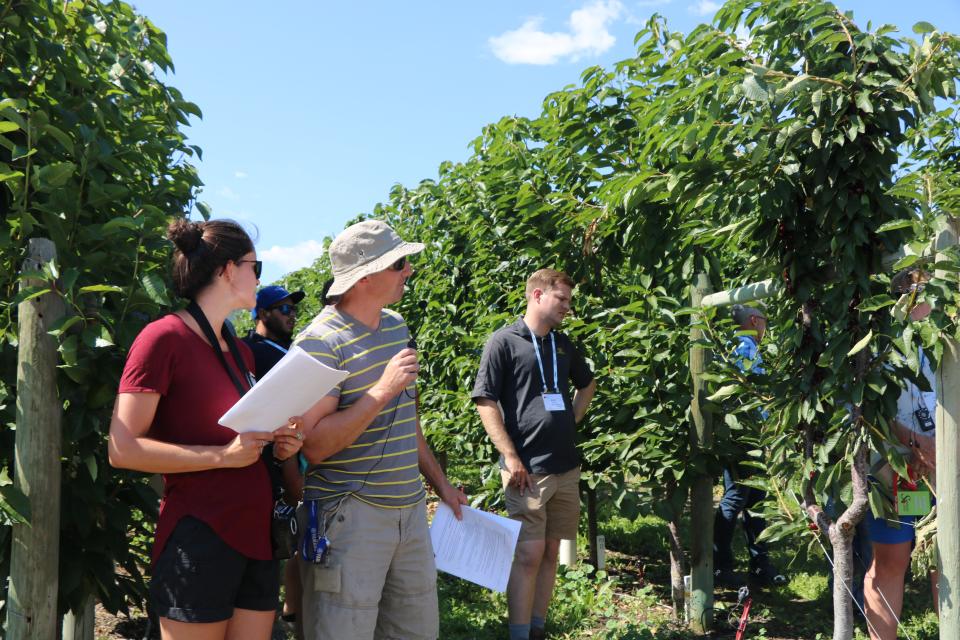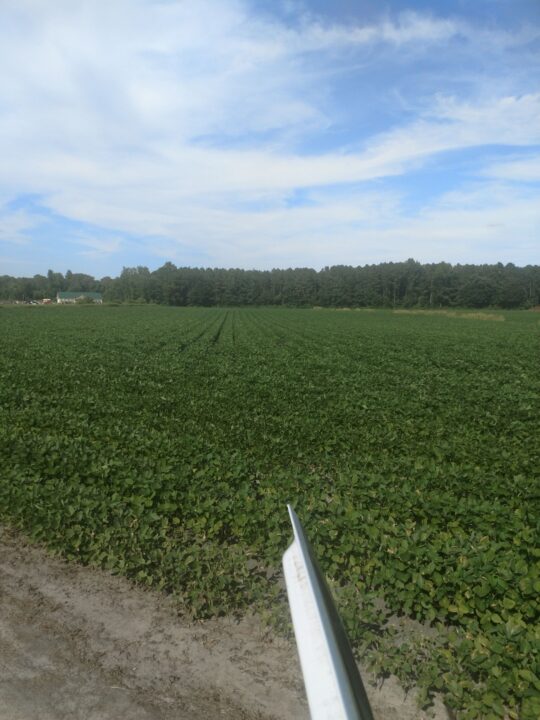New Research Shines Light on Crop Protection Alternatives to Fumigation

Paige Munro and Shawn Kuchta, Research Technicians in soil, nutrient, and water management in Tom Forge’s research program give International Fruit Tree Association British Columbia tourgoers an update on the replant and soil health trial. These 5-year-old double-stem ‘Skeena’ trees planted 5-by-13 on Gi.6 compare compost and amendments and bark mulch as alternatives to fumigation. Kuchta talks about how estimates of evapotranspiration to schedule irrigation in these trials. (Photo: Christina Herrick)
One of the most difficult challenges to orchard renewal is the threat of nematodes and the broader replant disease complex of which nematodes are a big part. It’s often why growers who wish to farm organically establish an orchard using conventional practices and then transition to organic production. Fumigation is believed to be the best way to get an orchard established on a replant site and set young trees on the right track.
“There’s always a replant disease complex, whether you’re talking apples, cherries, or even grapes,” says Tom Forge, Research Scientist in Applied Soil Ecology and Nematology with Agriculture and Agri-Food Canada in Summerland, BC. “There are similar types of issues with most perennial fruit crops, even small fruit crops like strawberries and raspberries, but they don’t always call them replant disease.”
New research out of Forge’s lab is showing promising results from amending soil with compost before replanting trees and adding bark mulch immediately after planting, versus fumigation.
Forge is quick to point out the distinct differences in fruit growing in British Columbia (BC) versus many places around the U.S., and elsewhere in Canada. With property prices at a premium in the heart of fruit production, many BC fruit growers farm small parcels of land near residential communities.
“Nobody does custom fumigation here anymore. It’s just too difficult working around all these small acreages that have houses around them,” he says.
Looking into Alternatives
These urban pressures have pushed research in the direction of alternatives to fumigation. Forge says a lot of the past research on fumigation alternatives has been focused more on control of the pathogens in the soil, and not addressing overall health of the soil and plant.
“When we started doing our work here, I thought I would take a slightly different tack. I thought I would look at the replant disease complex, not as a disease complex per se, but as a broader issue with soil health,” he says. “In the course of the previous cropping, there has been an overall decline in soil health, and proliferation of the lesion nematodes and other pathogens is part of that overall decline.”
Forge supposed that if organic amendments were used, they might suppress the nematodes, but they would also improve soil quality in other ways that would promote overall healthier root growth, resulting in trees that can better withstand attacks from nematodes in the soil.
His first trials were in the Fraser Valley,BC, in raspberries. Poultry manure, fumigation, and compost were compared in raspberry sites.
“What we ended up finding was that the compost application suppressed nematode populations and improved plant growth nearly as well as the fumigation and poultry manure treatments,” he says. “Especially when you got into the second year after replanting. Then it really started to look better.”
Moving to Cherries
From there, he looked to conduct similar trials in sweet cherries, because 95% of the sweet cherries in the country are grown in BC. Compost, compost and a bark mulch, fumigation, and untreated controls were compared in 25-foot plots. Over multiple years after planting, the research team took soil cores from each plot on a regular basis and studied root fragments and the lesion nematodes parasitizing them.
“Some amendments including raw manures can be biocidal by releasing ammonia or fatty acids into the soil. The compost, by definition, has been decomposed to the point that it shouldn’t have such effects,” he says. “We’re not looking to have a biocidal affect, we’re looking to enhance overall root health. Aerobic composts are also full of beneficial microbes that remain after the composting process.”
Forge says that in the first year of growth, the trees planted in fumigated soil were the most successfully established. But, by the second year, the trees with compost and compost and mulch had caught up to the trees in fumigated soil, and in subsequent years they started to grow better than the trees in fumigated soil.
“It is easy to see that early good growth in fumigated soil, and conclude that the trees are on their way,” he says. “If we were to stop the experiment at the end of the first season or into the second season, you would conclude that fumigation is still the best option.”
However, in the fourth and fifth years, cherry yields were as good as if not greater in compost-treated and mulched soil than in fumigated soil, and they were all greater than in non-treated soil. Forge points out that a long-term look at the success of alternatives to fumigation is necessary.
“On the soil biology and soil health side of it, by the end of the second growing season, the lesion nematode populations had come back in the fumigated plots to levels that were actually greater than in compost-treated soil,” he says. “With fumigation, you’re eliminating a lot of the natural enemies of the nematodes that help keep the nematode populations in check. In compost-treated soil, however, we have this suppression of the nematode population, they weren’t knocked back to the extent they are in fumigated soil, but they didn’t proliferate once we planted the trees.”
Forge’s research team has demonstrated enhanced populations of beneficial bacteria colonizing roots in the amended soil.
“They might be contributing to the suppression of lesion nematodes, in addition to improving root health by other means,” Forge says.
Looking Long-term
Forge emphasizes the benefits of organic amendments and that mulches aren’t limited to replanting.
“I encourage growers to use compost and mulches in their established orchard,” he says. “With regular surface applications, they’re not going to see the big rapid improvements in soil health that can be obtained by amending soil at the replant stage, but our earlier work indicates that similar benefits can be obtained over
the years.”
He says that so far they always use a high rate of application of a high-quality compost to get the maximum benefit.
“I would caution tree fruit growers, if they’re going to go the route we did, to seek out the highest quality, low nitrogen, low salt compost that they can find,” he says. “Don’t just throw anything in there.”










